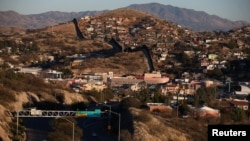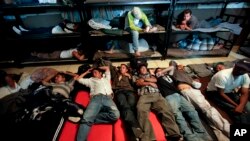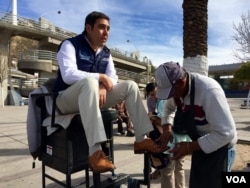Going from Nogales, Arizona, in the United States to Nogales, Sonora, in Mexico, you put your bags on a security belt and pass through a full-length turn style within the rusty, metal barrier that separates the two Nogales. No ID is required by Mexican authorities.
It is an easy trip and speaks to the relaxed, vibrant culture shared by the two cities, on either side of the border. They have been separated by a fence, one of the first on the border, for almost 100 years. It split the street that divided them, but not the spirit that unites them.
Now both sides fear their relationship may be in jeopardy if U.S. immigration policy changes to the point that deportations of undocumented immigrants increase dramatically. Many Mexican nationals who are deported from the United States are dropped off in Nogales, Mexico.
Mayor Temo Galindo says that his city receives from 50 to 70 deportees a day, but it would not be unprecedented for those numbers to increase tenfold. "The figure can increase to between 500 and 700 daily, which has happened before,” he says.
“These are not people from Nogales,” local reporter Felipe Ortiz Alor clarifies.“These are people from other states of the country.” He adds that many of them were deported because they were guilty of committing serious crimes in the United States. So right away, there is a security problem.
But it is quickly followed by a humanitarian one. “How to feed all these people, how to give them jobs and accommodate them, because not everyone is a criminal,” Alor says.“They need to survive here.”
Not the only Nogales to suffer
Nogales, Mexico, which had a population of almost 213,000 in 2010, is a manufacturing center for foreign businesses, including those from the U.S., and also, a transit point for agricultural goods shipped to the U.S.
But the business that might be most vulnerable to an influx of deportees is tourism. Nogales is a key entry point for U.S. tourists, who come to eat, drink and shop.
At midday, the streets are packed, and the sound of musica nortena (northern music) fills the air along with the smells of taco and elote (corn on the cob) carts.
Mayor Galindo, who along with his communications team is wearing a matching navy blue vest, stops for a shoe shine, as he talks to VOA about what is at stake.He says the positions of the U.S. president put “at risk the intensity of commercial exchange that we have.”
And he warns that Nogales, Mexico is not the only Nogales that will be hurt, “They say that for every dollar that an American spends here in Nogales, Sonora, a Mexican from here in Nogales will spend up to five dollars in Nogales, Arizona.”
When the dust settles…
Nogales, U.S., Mayor John Doyle says the two cities have a relationship built on mutual respect and their joint economic interests.But he says fear is currently hanging over both communities, especially the Mexican one.
“People that have legal documents to cross over and shop and do what they're going to do.They're a little concerned, are we going to be intimidated?Are we going to be mistreated?Are our documents going to be taken away from us for no reason at all?”
About a tenth the size of its Mexican neighbor, Nogales, U.S. is only a smaller, quieter version. Its hilly downtown streets are festooned with bilingual signs for pawn shops and money exchanges.
Because of its location, the city channels billions of dollars in agricultural produce and manufactured goods from Mexico to the rest of the United States.Another - and in some sense competing - economic engine is the U.S. Department of Homeland Security that employs thousands in its Border Patrol, and Customs and Border Protection agencies.
Doyle concedes the city went through a rough patch after the 9/11 terrorist attacks because of Border Patrol’s relationship with the immigrant community.
“Now this is another step that we will probably come out of when the dust settles,” he says.“And hopefully that fear will be gone.”
WATCH: Bound by Mutual Interests, US-Mexico Border Towns Hope to Maintain Ties










